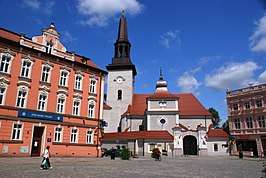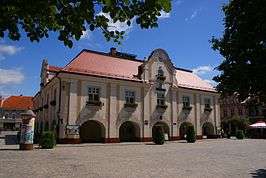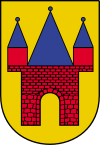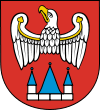Jarocin
Jarocin ([jaˈrɔt͡ɕin]) (German: Jarotschin) is a town in central Poland with 25,700 inhabitants (1995), the administrative capital of Jarocin County. Since 1999 Jarocin has been located in Greater Poland Voivodeship, prior to that it was located in the Kalisz Voivodeship (1975–1998).
Jarocin | |
|---|---|
  St Martin's Church with marketplace (top) and town hall (bottom) | |
 Coat of arms | |
 Jarocin | |
| Coordinates: 51°58′N 17°30′E | |
| Country | |
| Voivodeship | Greater Poland |
| County | Jarocin County |
| Gmina | Gmina Jarocin |
| Established | 13th century |
| Town rights | 1257 |
| Government | |
| • Mayor | Adam Pawlicki |
| Area | |
| • Total | 14.44 km2 (5.58 sq mi) |
| Population (2006) | |
| • Total | 25,834 |
| • Density | 1,800/km2 (4,600/sq mi) |
| Time zone | UTC+1 (CET) |
| • Summer (DST) | UTC+2 (CEST) |
| Postal code | 63-200 |
| Area code(s) | +48 62 |
| Car plates | PJA |
| Climate | Cfb |
| Website | http://www.jarocin.pl/ |
Jarocin is a historical town, having been founded and granted city rights in the 13th century.[1] The marketplace features a Ratusz town hall built between 1799 and 1804, which is now home to the Jarocin Regional Museum.
The town also became famous in the 1980s thanks to the Jarocin Festival, one of the first rock-punk music festivals of the former Warsaw Pact and in Europe. The first event was organised in 1980.[2]
History
The lordship of Jarocin was first mentioned in a 1257 deed issued by Duke Bolesław the Pious of Greater Poland. The town was conveniently located at the intersection of the trade routes from Wrocław to Toruń and from Poznań to Kalisz.
Jarocin was annexed by the Kingdom of Prussia in the 1793 Second Partition of Poland and administered within South Prussia. It was part of the Duchy of Warsaw from 1807–13 during the Napoleonic Wars, but was restored to Prussia afterwards. The town was included within the Grand Duchy of Posen from 1815 and the Province of Posen from 1848. It became part of the German Empire in 1871. In 1889 it was included within the newly created Jarotschin District of the Province of Posen.
Jarocin participated in the Greater Poland Uprising (1918–1919) and had the first soldiers' council in the Province of Posen. It was subsequently included in the Second Polish Republic. The West German Minister and former SS officer Waldemar Kraft was born here at Brzustow in 1898.
The town was annexed by Nazi Germany in 1939 during World War II and administered within Reichsgau Wartheland as part of the district or county (kreis) of Jarotschin. Many Polish citizens, especially Jews, were expelled and replaced with ethnic Germans from the Baltic states, Volhynia, and Bukovina. A forced labor prison operated in the vicinity from January 1941 to January 1945.[3] Following the arrival of the Red Army and the end of the war, Jarocin was made part of the People's Republic of Poland.
Gallery
 Radoliński Palace, a 19th century depiction
Radoliński Palace, a 19th century depiction Radoliński Palace today
Radoliński Palace today St. George Church
St. George Church Jarocin Festiwal, 1984
Jarocin Festiwal, 1984_Lichen99.jpg) Railway station
Railway station
Twin towns
Jarocin is twinned with:






People
- Eduard Lasker (1829–1884), politician
- Gustav Wegner (1903–1942), German athlete
- Dame Elisabeth Schwarzkopf (1915–2006), operatic lyric soprano
- Waldemar Kraft (1898–1977), West German Minister without portfolio
- Czesław Madajczyk (1921–2008), Polish historian
- Sławomir Majusiak (born 1964), Polish long-distance runner
- Robert Baran (born 1994), Polish wrestler
References
- "Jarocin - Dzieje miast - Region Wielkopolska - a must see". regionwielkopolska.pl. Retrieved 26 June 2017.
- "Jarocin'17". jarocinfestiwal.pl. Retrieved 26 June 2017.
- Zwansarbeit in NS-Staat. German Federal Archive (Bundesarchiv). Accessed 9-30-11.
